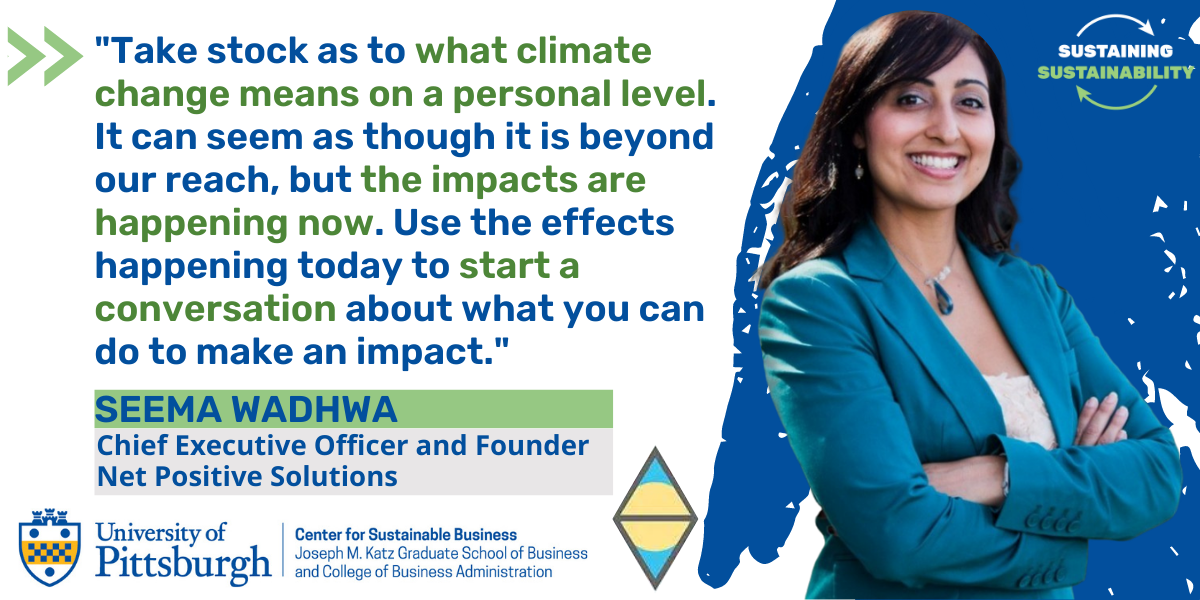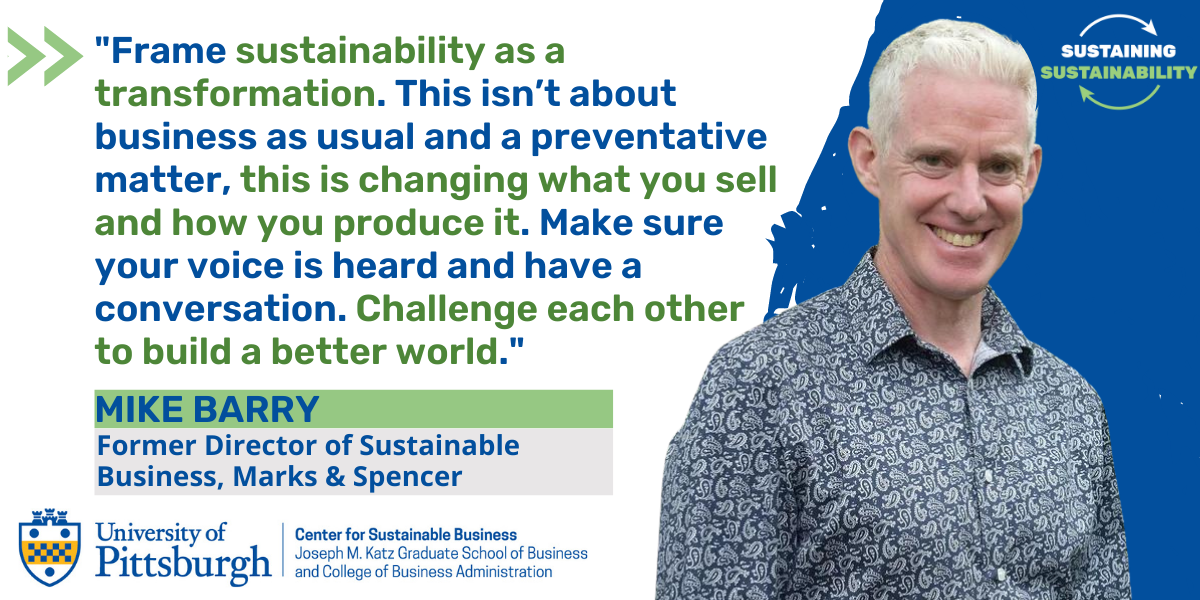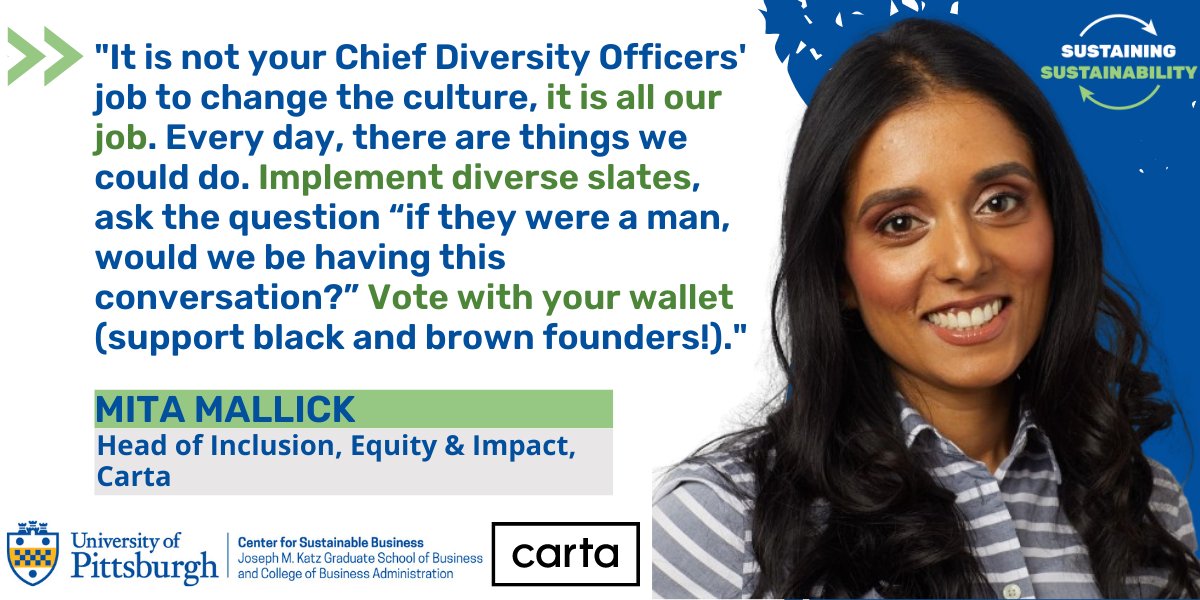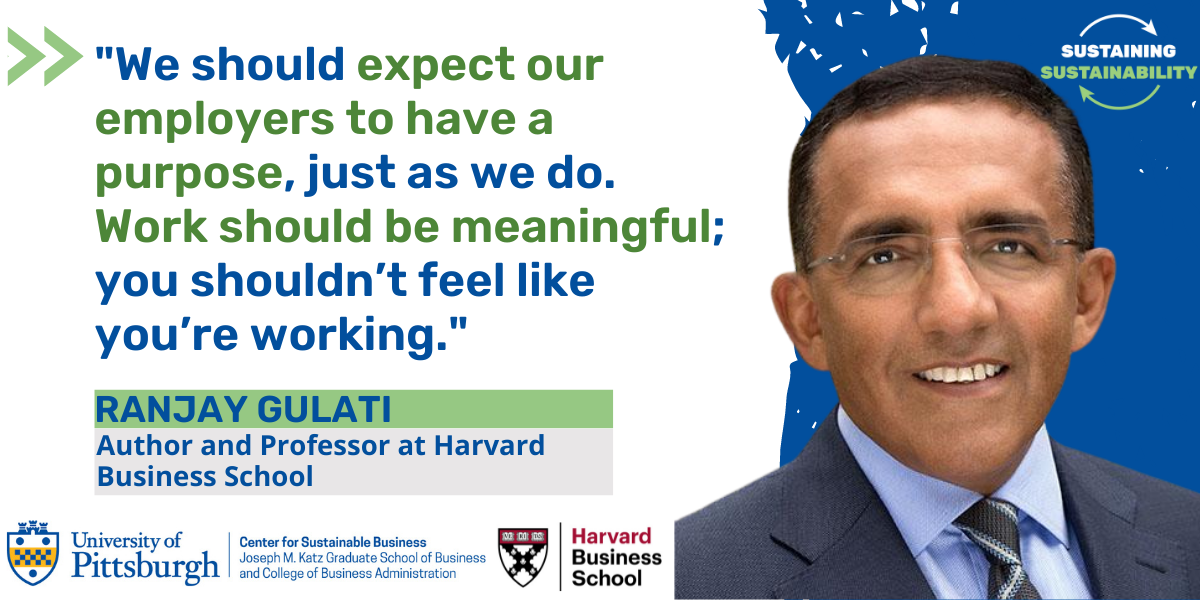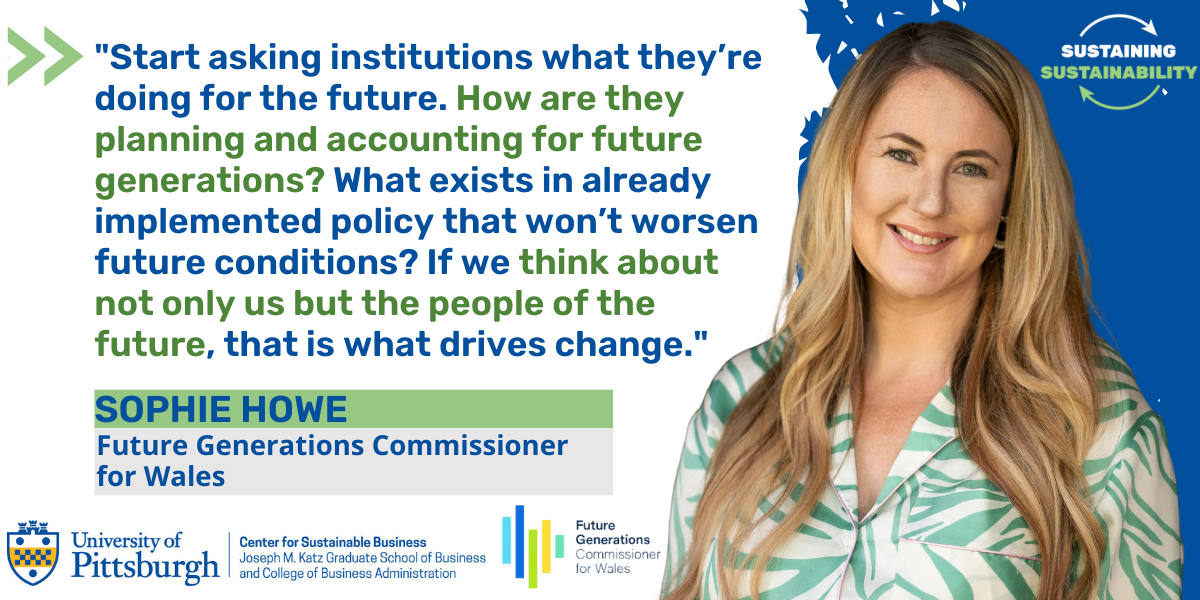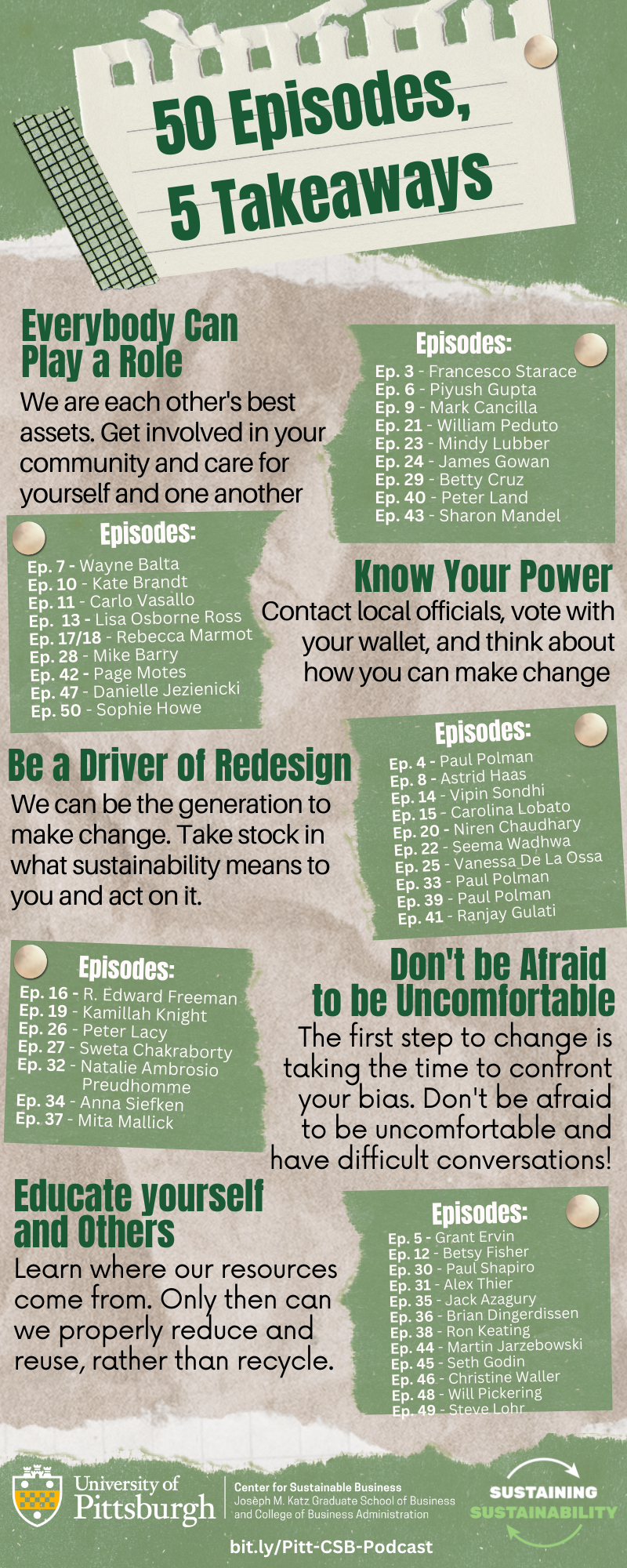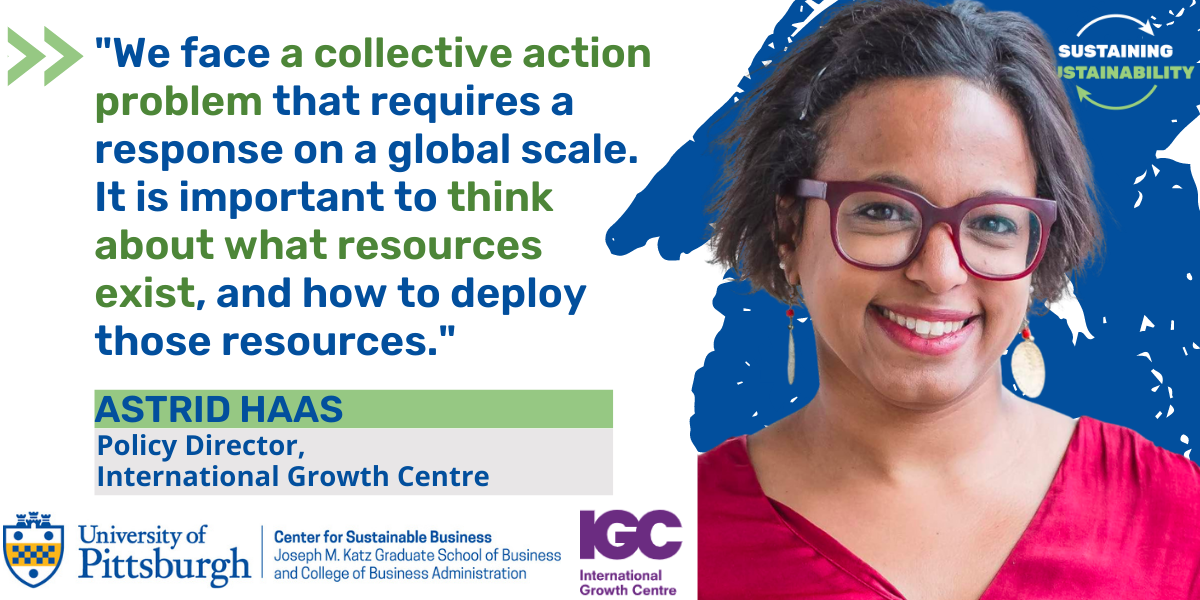
We're proud to share our 50 calls to action (and counting) with you in honor of the 50th episode of Sustaining Sustainability
In November, we released our 50th episode, "Thinking Long-Term & Constructive Disruption" with Sophie Howe, Future Generations Commissioner. In each episode, CB asks the guest what their call to action for listeners is, here are 50 actionable steps you and/or your organization can take to pursue sustainability. >> View the recap here
All of us need to take ownership of the future.
CB Bhattacharya (Host) from the University of Pittsburgh Center of Sustainable Business, Episode 1 - "Sustaining Sustainability — Introduction to the Series"
You will fail if you don’t think about the common good. Stay safe, COVID is dangerous. Think and demand honesty from political figures. We need to ask better questions and demand better answers from our political figures.
Jeffery Sachs, Director of the Center for Sustainable Development at Columbia University and Director of the United Nations Sustainable Development Solutions Network, Episode 2 - "What’s going to happen to the UN SDGs? — with Jeffrey Sachs"
The climate crisis and COVID are everyone’s problem, and we need to work together to solve it. Companies need to do their part, so invest their money somewhere beneficial rather than hoarding it.
Francesco Starace, CEO and General Manager of Enel, Episode 3 - "Leading an Energy Company in the COVID-19 Era — with Francesco Starace"
Drive the redesign of economy. There is an enormous risk of social upheaval. Think about your business model in relation to creating a cleaner and more sustainable environment. Advocate for meaningful policy and put money in areas of development. We need leaders with ambition who will put the general’s interest at hand rather than their own.
Paul Polman, former CEO of Unilever, Co-Founder of IMAGINE, and Chair of the International Chamber of Commerce, Episode 4 - "The Urgency of Collaboration — with Paul Polman"
Be aware of the food systems, digital systems, and environmental systems around us.
Grant Ervin, Chief Resilience Officer and Sustainability Manager for the City of Pittsburgh, Episode 5 - "Resilient Cities Need Strong Networks — with Grant Ervin”
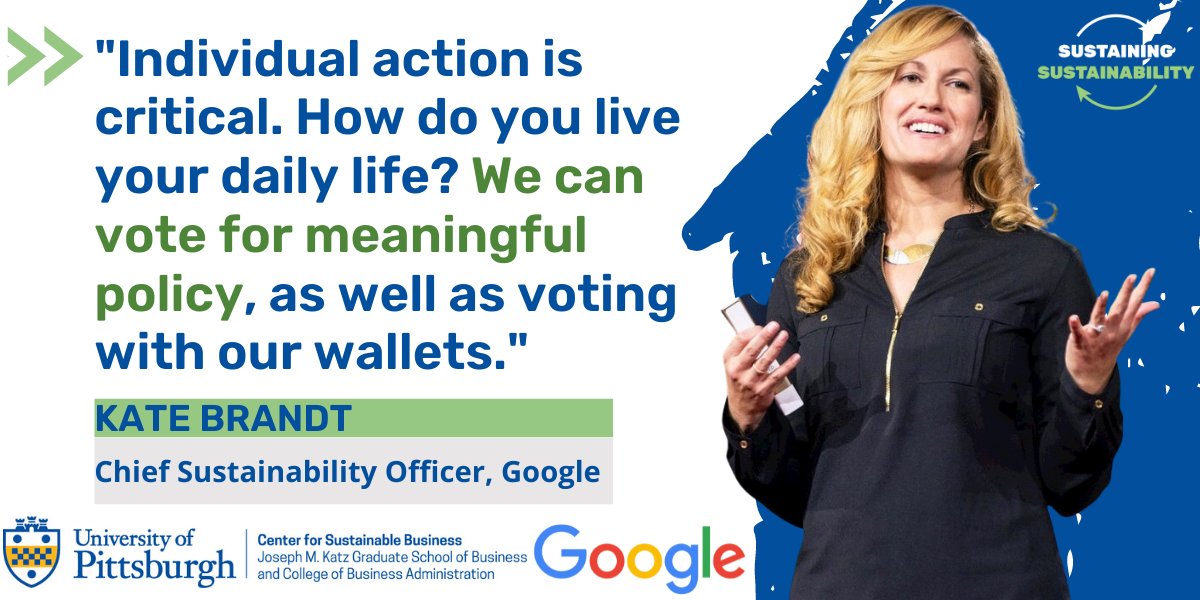
It is easy to look for someone to blame, so be very thoughtful and clear about the role you play in your community. Each one of us can make a difference. It is easy to feel defeated, but every person and voice counts.
Piyush Gupta, CEO and Director of DBS Group, Episode 6 - "Finance & Banking During a Global Pandemic — with Piyush Gupta"
Pay attention to claims about green products. How are the things you’re using generally good for the environment? If consumers focus on the life-cycle issue, we can differentiate between the big and small problems. Make better choices for your local community.
Wayne Balta, Vice President of Corporate Environmental Affairs and Product Safety at IBM, Episode 7 - "Digital Technology for the Environment — with Wayne Balta"
We face a collective action problem that requires a response on a global scale. It is important to think about what resources exist, and how to deploy those resources.
Astrid Haas, Policy Director of the International Growth Centre, Episode 8 - "Urban Infrastructure and COVID-19 in the Global South — with Astrid Haas"
Primarily put your health and safety first. People are our greatest asset. Without people, we won’t be able to make any meaningful change. Without healthy, diverse, and intelligent people, our sustainability efforts will fall short.
Mark Cancilla, Vice President of Environment, Health and Safety at PPG, Episode 9 - "Workplace Safety in Essential Industries during COVID-19 — with Mark Cancilla"
Individual action is critical. How do you live your daily life? We can vote for meaningful policy, as well as voting with our wallets.
Kate Brandt, Chief Sustainability Officer at Google, Episode 10 - "The Role of Tech in Driving Sustainability — with Kate Brandt"
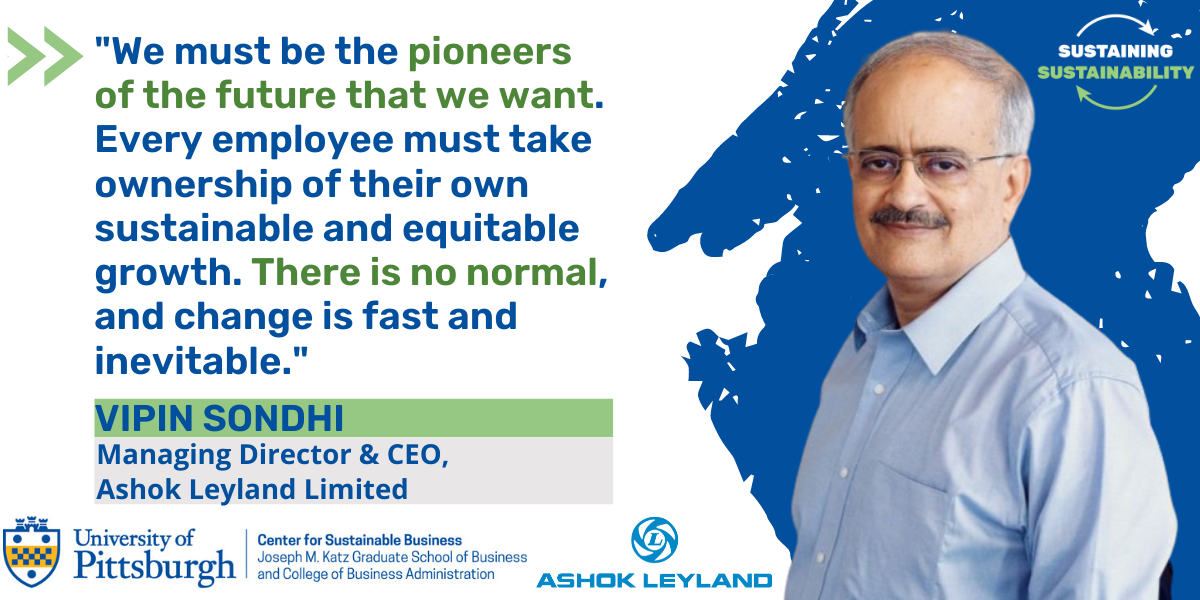
Consumers need to use their purchasing power more. It is the current consumer who can redirect their dollar to more sustainable choices. Companies, as well, have the duty to follow and work towards sustainability goals and show their work towards the consumer.
Carlo Vasallo, CEO of Ferrero Germany, Episode 11 - "Global Supply Chains, Retail Distribution, and Consumer Behavior — with Carlo Vassallo"
Visit the Refugee Rights website, as many communities have a refugee resettlement agency if you want to get involved locally.
Betsy Fisher, Director of Strategy at the International Refugee Assistance Project, Episode 12 - "Refugee Assistance during a Global Pandemic — with Betsy Fisher"
Know your power. If you are a student or employee, you have a remarkable amount of power. Customers as well, they can boycott a company. Now is the time for everyone to look around, assess the situation, and use their power.
Lisa Osborne Ross, Chief Operating Officer of Edelman US and President of Edelman Washington DC, Episode 13 - "Brand Trust during the COVID-19 Pandemic — with Lisa Osborne Ross"
We must be the pioneers of the future that we want. Every employee must take ownership of their own sustainable and equitable growth. There is no normal, and change is fast and inevitable.
Vipin Sondhi, Managing Director and CEO of Ashok Leyland Limited, Episode 14 - "Commercial Vehicles and Supply Chain Sustainability — with Vipin Sondhi"
It is time to rethink and redesign our companies for the future. We can no longer think about business in the same way we did 5 years ago.
Carolina Lobato, Vice President of Legal at Kinross Brasil Mineração, Episode 15 - "Mining and Community Engagement — with Carolina Lobato"

We can be the generation to make business and capitalism better. We need to get better at having conversations and not being afraid to disagree. Think about your purpose and how you want to make your mark.
R. Edward Freeman, University Professor at University of Virginia and member of the CSB Academic Advisory Council, Episode 16 - "Stakeholder Theory and COVID-19 — with R. Edward Freeman"
Remember that we are living through unprecedented times, take care of each other. The American people can use their votes to be heard. How do we spend our money? Use your wallet to vote and drive change!
Rebecca Marmot, Chief Sustainability Officer at Unilever, Episode 17 & 18 - "Corporate Sustainability Strategy during COVID-19 — with Rebecca Marmot (Part 1 & 2)"
Now more than ever is the chance to learn and educate ourselves. Be sensitive to others but be uncomfortable and have conversations that you usually wouldn’t.
Kamillah Knight, Director of Diversity and Inclusion at Ferrero North America, Episode 19 - "Diversity, Equity, and Inclusion during COVID-19 — with Kamillah Knight"
The pandemic and January 6th have been troubling, but everyone should remember that the Senate and House of Reps came back and finished their job. Violence is not the answer and leaders should be radically transparent and candor. Make companies a reflection of the world that we wish to see.
Niren Chaudhary, CEO of Panera Bread, Episode 20 - "Leading with Compassion during a Crisis — with Niren Chaudhary"
When it comes to the Marshall Plan, stay informed. There are our outlets to learn about the implications and when the time comes, make your voice heard.
William Peduto, former Mayor of the City of Pittsburgh, Episode 21 - "Marshall Plan for Middle America — with Mayor William Peduto"
Take stock as to what climate change means on a personal level. It can seem as though it is beyond our reach, but the impacts are happening now. Use the effects happening today to start a conversation about what you can do to make an impact.
Seema Wadhwa, CEO and Founder of Net Positive Solutions, Episode 22 - "Climate Change and Public Health — with Seema Wadhwa"
Integrate sustainability into your life. Learn about what you truly need, think about what you eat, and think about your role as a citizen. Vote your conscience, you can make a difference.
Mindy Lubber, CEO and President of Ceres, Episode 23 - "Transforming the Economy for a Sustainable Future — with Mindy Lubber"
Be optimistic for future generations! We are all in this together, be good to each other, and get involved in your communities! Sustainability is truly about everyone working together.
James Gowan, Senior Vice President of Global Supply Chain and Chief Sustainability Officer at Verizon, Episode 24 - "Sustainability Strategy at Verizon — with James Gowen"
Even though you may feel lost, either as a company or individual, take small steps in your own life. Bring those ideas to the workplace and see how you can truly implement sustainability.
Vanessa De La Ossa, Vice President of Sustainable Finance Americas at ING, Episode 25 - "Sustainable Finance — with Vanessa De La Ossa"
Make sure that all the different roles that we play align, we are all in this together. We can all help marshal and put pressure on the business contributions to the race to zero. The days of basic “general” sustainability are behind us.
Peter Lacy, Global Sustainability Service Lead and Chief Responsibility Officer at Accenture, Episode 26 - "Sustainable Ecosystems — with Peter Lacy"
Take the time and confront your innate bias. Ask why our bias is there. Our perceptions aren’t always calibrated with the present risk. Reach out to your peers and collaborators and get power in numbers related to sustainability. Take advantage of the tools available to us!
Sweta Chakraborty, a risk and behavioral scientist who also is the U.S. Representative for “We Don’t Have Time,” Episode 27 - “Human biases in perceiving the threat of Climate Change and how to correct them”
Frame sustainability as a transformation. This isn’t about business as usual and a preventative matter, this is changing what you sell and how you produce it. Make sure your voice is heard and have a conversation. Challenge each other to build a better world.
Mike Barry, former Director of Sustainable Business at Marks & Spencer, Episode 28 - “Sustainability Business Strategy - with Mike Barry”
It is easy to get overwhelmed with not knowing where to start or dismiss the challenge in front of us, but you have a choice to make a change. What can we do as individuals? What can I do as part of an institution? Don’t be too overwhelmed to act!
Betty Cruz, President and CEO of World Affairs Council of Pittsburgh, Episode 29 - “Sustainable Future - with Betty Cruz”
There is a lot of concern about what is happening to the planet. We need to recognize that the meat problem doesn’t get discussed enough. Many big companies are making the switch, but we can make efforts to work in this field and throw our hats in the ring to take on the animal-based industry.
Paul Shapiro, author of Clean Meat: How Growing Meat Without Animals Will Revolutionize Dinner and the World, and the CEO of The Better Meat Co., Episode 30 - “Clean Meat - with Paul Shapiro”
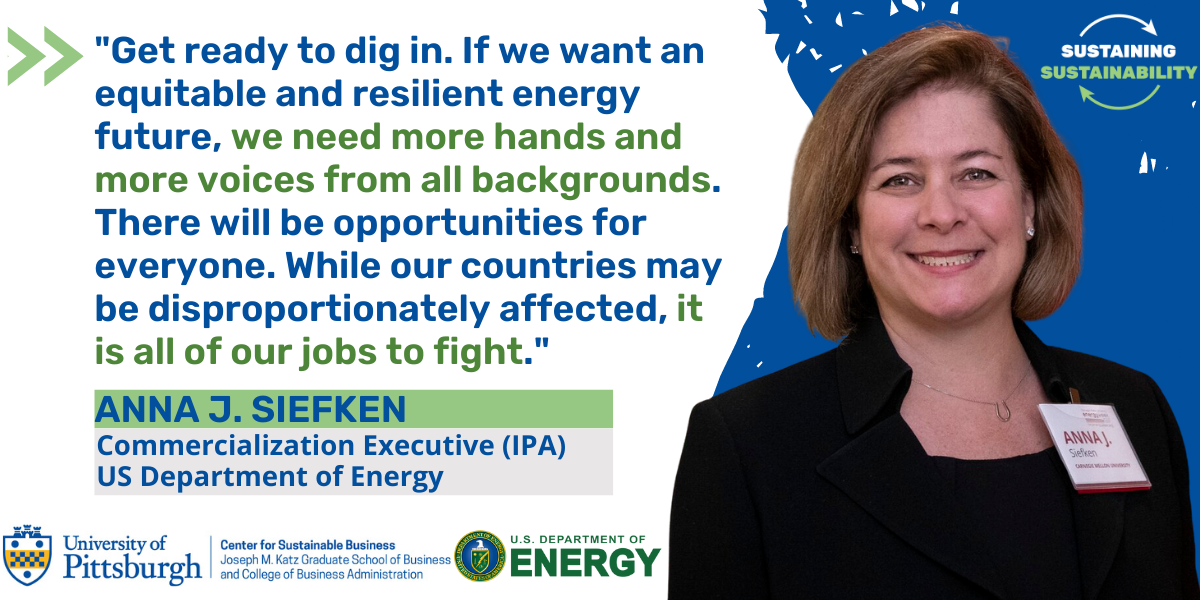 Firstly, inform yourself. Secondly, use your power as a citizen to make sure that you’re represented in this issue. Thirdly investigate what you buy and who you buy from, are they against modern slavery? Finally, there are many organizations that are working on the front lines to eradicate modern.
Firstly, inform yourself. Secondly, use your power as a citizen to make sure that you’re represented in this issue. Thirdly investigate what you buy and who you buy from, are they against modern slavery? Finally, there are many organizations that are working on the front lines to eradicate modern.
Alex Thier, former CEO of the Global Fund to End Modern Slavery, Episode 31 - “Modern Slavery - with Alex Thier”
Take a tangible next step in incorporating climate stage into your work. Start reviewing and reading about risk assessment. If you’ve already started, how can you take risk assessment to climate resilience? Don’t be complacent and think about the next step.
Natalie Ambrosio Preudhomme, Director at Moody's ESG Solutions, Episode 32 - “Finance and Climate Risks - with Natalie Ambrosio Preudhomme”
We need to move away from declarations and promises and need to move toward action.
Paul Polman, former CEO of Unilever, Co-Founder of IMAGINE, and Chair of the International Chamber of Commerce, Episode 33 - “Paul Polman's Keynote Address - with Paul Polman, CEO and Co-Founder, IMAGINE”
Get ready to dig in. If we want an equitable and resilient energy future, we need more hands and more voices from all backgrounds. There will be opportunities for everyone. While our countries may be disproportionately affected, it is all of our jobs to fight.
Anna J. Siefken, Commercialization Executive (IPA) at the US Department of Energy, Episode 34 - “Insights from COP26 - with Anna Siefken, Wilton E. Scott Institute for Energy Innovation”
We are in the 11th hour. Our children will face climate issues, this is not a distant catastrophe, and this is everyone’s issue. The time is now to act.
Jack Azagury, Senior Management Director – Market Unit Lead – US Northeast at Accenture, Episode 35 - “Accenture Sustainable Business Strategy - with Jack Azagury, Accenture”
Getting educated on sustainability issues and better understanding the realities of climate change (as well as sustainability transitions). You can’t only be focused on environmental factors; we need to consider social factors as well.
Brian Dingerdissen, Vice President, Investor Relations and Communications and ESG, and Chief of Staff to the CEO, for Essential Utilities, Inc., Episode 36 - “Utility Sustainability - with Brian Dingerdissen, Essential Utilities”
It is not your Chief Diversity Officers' job to change the culture, it is all our job. Every day, there are things we could do. Implement diverse slates, ask the question “if they were a man, would we be having this conversation?” and vote with your wallet (support black and brown founders!).
Mita Mallick, Head of Inclusion, Equity and Impact at Carta, Episode 37 - “The "S" of ESG - with Mita Mallick, Carta”
Water is critical and a finite resource. By 2050, ¼ people will live in a country affected by chronic water challenges. We need to find innovative solutions and make sure we are delivering sustainable solutions. Minimizing the impact on water as a whole is everyone’s responsibility. If you didn’t start yesterday, start today.
Ron Keating, CEO of Evoqua Water Technologies, Episode 38 - “What to Do About Water - with Ron Keating, Evoqua”
We need a new type of leadership to bring humanity back to business. Now, we are living in a time where the cost of not acting is greater than the cost of acting, and we must respond accordingly.
Paul Polman, former CEO of Unilever, Co-Founder of IMAGINE, and Chair of the International Chamber of Commerce, Episode 39 - “The Journey to Net Positive - with Paul Polman, IMAGINE”
Everybody can play a role. Personal changes can be large or small, but they all matter. Diversity is now, more than ever, an imperative.
Peter Land, Senior Vice President and Chief Communications in Sustainability Officer at Dick’s Sporting Goods, Episode 40 - “Public Accountability and Getting Things Done - with Peter Land, Dick’s Sporting Goods”
We should expect our employers to have a purpose, just as we do. Work should be meaningful; you shouldn’t feel like you’re working.
Ranjay Gulati, professor at Harvard Business School, Episode 41 - “Deep Purpose - with Ranjay Gulati, Harvard Business School & Best-Selling Author”
As a consumer, you have power. Uptick our own expectations on brands so that demand translates into progress and action. Don’t let a remote environment be daunting. Keep a “glass half full” outlook, you can have an impact!
Page Motes, Head of Global Sustainability at Dell Technologies, Episode 42 - “Managing Stakeholder ESG Expectations - with Page Motes, Dell Technologies”
Companies and government, at the end of the day, are people. We each have the opportunity to do something, and we need to do our part. We can’t forget our societal goals of a just and sustainable world. Lead by example.
Sharon Mandel, Senior Vice President and Chief Information Officer at Juniper Networks, Episode 43 - “The Great Redesign - with Sharon Mandell, Juniper Networks”
Take the long view. Take a step back and depolarize sustainability. If we focus on transparency, materiality, and collaborative engagement, then this will lead to risk mitigation, adaptation, and true stewardship.
Martin Jarzebowski, the Director of ESG & Responsible Investing at Federated Hermes, Episode 44 - “Responsible Investing and Stewardship - with Martin Jarzebowski, Federated Hermes”
Pivoting company models to be more sustainable is a must. Our technology is evolving, and so should our companies to reflect this evolution.
Paul Polman, former CEO of Unilever, Co-Founder of IMAGINE, and Chair of the International Chamber of Commerce, ”CSB Solution Saloon with Paul Polman - What Leadership do Companies Need To Thrive In 2022?”
Buy his book, he doesn’t have every answer, but he wants to spur conversation and stimulate the market to solve problems.
Seth Godin, writer, 5-time TED talk speaker, founder of Akimbo, and coordinator of The Carbon Almanac: It’s Not Too Late. Episode 45 - “Why We Should Care About Carbon - with Seth Godin, Coordinator of The Carbon Almanac”
Consider Duquesne Light a partner in your journey to reduce your impacts on the planet, stimulate economic growth, and to make a difference in the community you live in.
Christine Waller, Vice President of Communications, ESG, and Corporate Giving at Duquesne Light Company, Episode 46 - ”Furthering the Clean Energy Transition with Christine Waller, Duquesne Light Company”
Just look up who your elected officials are and ask them to pass a climate bill.
Danielle Jezienicki, Senior Director of Sustainability at Grove Collaborative, Episode 47 - “Pursuing Incremental Milestones with Danielle Jezienicki, Grove Collaborative”
Take an interest in where their drinking water comes from and goes. So much of our infrastructure is underground and unseen, and if you learn a little more, you’ll develop a greater appreciation.
Will Pickering, Chief Executive Officer at Pittsburgh Water and Sewer Authority (PWSA), Episode 48 - ”Building Water Equity with Will Pickering, Pittsburgh Water and Sewer Authority”
Think about what you can do to use less water and energy in your everyday life. Before even getting to the recycling phase, how can we truly reduce and reuse?
Steve Lohr, President and CEO at J. Lohr Vineyards & Wines, Episode 49 - “Sharing Wine, Sustainability, & Science with Steve Lohr”
Start asking institutions what they’re doing for the future. How are they planning and accounting for future generations? What exists in already implemented policy that won’t worsen future conditions? If we think about not only us but the people of the future, that is what drives change.
Sophie Howe, Future Generations Commissioner for Wales, Episode 50 - “Thinking Long-Term & Constructive Disruption | Sophie Howe, Future Generations Commissioner”

